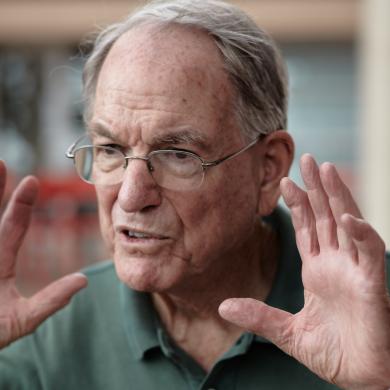
The Work Goes On
Samuel Bowles on his deep interest in the causes of inequality & his work to transform economics
Samuel Bowles, Emeritus Professor of Economics at the University of Massachusetts and Research Professor and Director of the Behavioral Sciences Program at the Santa Fe Institute, discusses his deep-rooted interest in economic inequality and how his work has challenged many of the conventional assumptions of modern economic theory.
In this episode, Bowles and Ashenfelter discuss:
- How Bowles’ experience of witnessing stark inequality in India as a boy compelled him to examine questions of social justice. “[It]... bothered me about how we could all be so similar across the world and yet there are differences in income between countries like India at the time and U.S. ... I was puzzled by that and probably more than anything else that's why I ended up in economics.”
- Bowles’ budding interest in economics while working as a teacher in Nigeria after graduating from Yale University.
- How Bowles’ friendship and work with Martin Luther King, Jr. led him to want to change the emphasis of the economics profession. “This is why I studied economics so I could actually get into the fray and help out and make the world a better place…. And I decided then and there that I was either going to leave economics, I considered that very seriously, or I would try to change it. And that's what I've been trying to do since.”
- Bowles’ collaboration with economist Herb Gentis and their work on how schools in the United States socialize students to conform to the existing social and economic structures. “… [S]chools do this primarily by the ways [they] organize the experiences of kids, how they relate to each other, how they relate to people in authority, like teachers and so on.”
- Bowles’ research on how character traits govern success in the workplace and education.
- Bowles’ ongoing research at the Santa Fe Institute into the origins of inequality, from the time of hunters and gatherers to the advent of farming and beyond.
- Bowles’ work as a founding member of the Union for Radical Political Economics and his efforts to create an introductory economics courses and resources, called CORE (Curriculum Open-access Resources in Economics), that addresses questions of climate change, inequality, future of work, and innovation, among others.
Samuel Bowles earned his Ph.D. in economics from Harvard University in 1965. He is currently Emeritus Professor of Economics at the University of Massachusetts and the head of the Behavioral Sciences Program at the Santa Fe Institute. He has also served as an economic advisor to the governments of Cuba, South Africa and Greece, to U.S presidential candidates Robert F. Kennedy and Jesse Jackson, to the Legislature of the State of New Mexico, to the Congress of South African Trade Unions, and to South African President Nelson Mandela. "The Work Goes On"—a podcast produced as Princeton's Industrial Relations Section (IR Section) celebrates its 100th anniversary—is an oral history of industrial relations and labor economics hosted (typically) by Princeton's Orley Ashenfelter.
